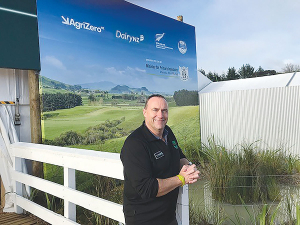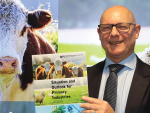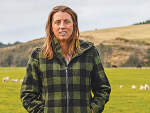Showcasing the huge range of new technologies and science that is now available was one of the highlights at last week's National Fieldays.
This marks a return to what was a feature of Fieldays back in the 1970s and '80s when the Ministry of Agriculture, as it was then known, ran special seminars and events for farmers to make sure they were up to speed with the latest science relating to agriculture.
This year, once again, the Ministry for Primary Industries (MPI) took a leadership role in this area, well supported by a host of other science providers to set up a main Science for Farmers site and several other hubs around the venue on such topics as wool and forestry.
MPI's chief science advisor (and now the PM's chief science advisor), Dr John Roche says their site was 50% bigger than it was last year and one that was designed to attract farmers to engage with a whole range of experts.
The site featured modules on farming for profit and highlighted issues around greenhouse gas emissions and how close some of the mitigation tools are to becoming available.
"Every year these technologies seem to get two years closer and so it's really topical to have conversations about these with farmers," he says.
Also on the site was a module on gene technologies with LIC and AgResearch talking about the technologies that are going to come along that will accelerate genetic improvement in cows and cattle.
Roche says also on the site was a team from Massey University who were focusing on climate resilience and showing some of the pasture species they are growing.
"This linked in nicely with the modelling that Pamu are doing on their farms around the country on what the climate may look in 2050 and how they are planning their farms to be ready for this," he says.
One of the features of the Science for Farmers site was the creation of two wetlands - one a normal one and the other a kind of riparian wetland. The purpose of these models was for staff from Massey University, DairyNZ and AgResearch to talk about some of the mitigation strategies that have been developed to reduce the impact of farming on freshwater.
Roche says there are a whole lot of options ranging from building detention bunds to the use of plantain to reduce nitrate leaching.
He says the aim has been to highlight the need to balance productivity, profitability, environmental sustainability and future climate resilience.
Pasture Project
A seven-year programme, costing $17 million, will look at why pastures are not lasting as long.
DairyNZ analysis suggests pasture renewal rates are increasing as pasture harvest is declining - by 0.5 to 1 tonne of DM/ha per decade across Waikato and Northland.
The collaborative science and research programme - Resilient Pastures - was announced at Fieldays last week by Agriculture Minister Todd McClay. Government is providing $8m towards the project.
Pasture is vital to the New Zealand economy. It provides a sustainable, low-cost feed source, underpinning the country's competitive advantage in global markets and without action, pasture persistence and productivity will likely continue to fall.
"This is one where we need to work together to ensure we can adapt and remain productive and sustainable in a changing climate," DairyNZ chair Tracy Brown says.
"It's a real concern for the country as a whole as it poses a threat to our pasture-based value proposition and to dairy as our biggest export earner. The solutions we discover and help farmers to adopt during this project will ultimately benefit all regions across the country."
B+LNZ chair Kate Acland says pasture is the foundation of red meat farming systems.



















